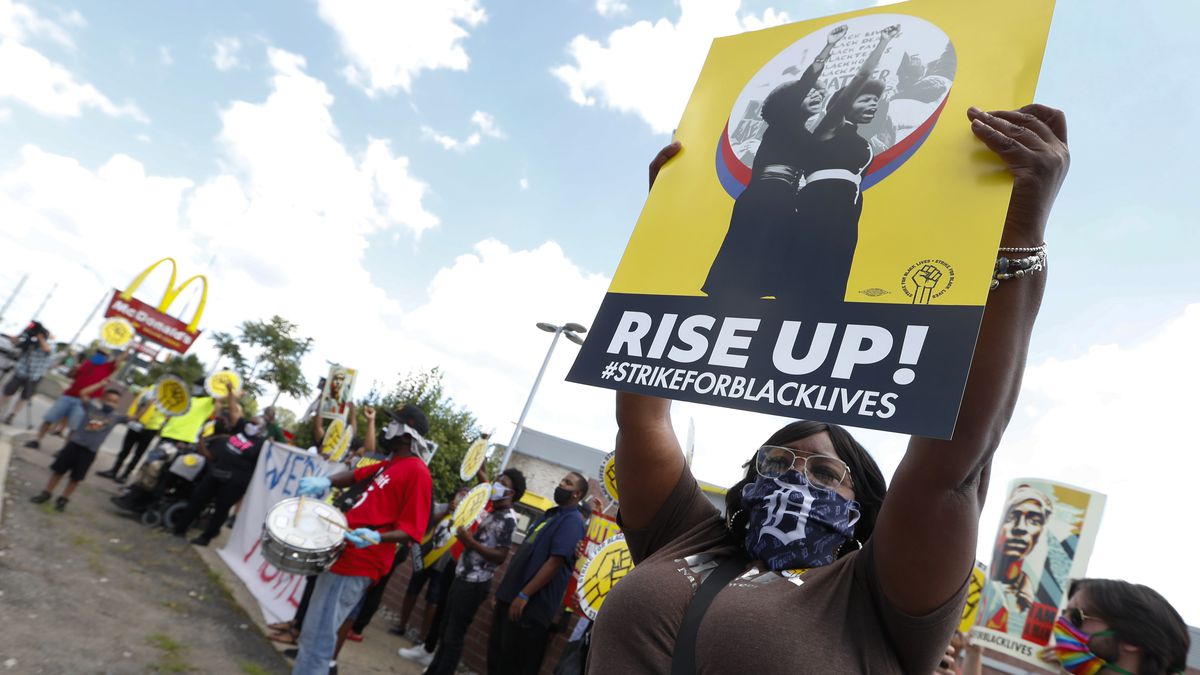Essential workers in 160 cities walk off their jobs in ‘Strike for Black Lives’

A few minutes every morning is all you need.
Stay up to date on the world's Headlines and Human Stories. It's fun, it's factual, it's fluff-free.
On Monday, approximately 20,000 essential workers in 160 cities of the United States walked off their jobs in a planned strike to protest systemic racial injustice and economic inequality, which have been exacerbated by the COVID-19 pandemic.
“All over the United States, farmworkers, nurses’ aides, hotel housekeepers, Uber, delivery, truck and bus drivers, airport cabin cleaners, Amazon warehouse workers, Walmart associates, and more walked off the job to demand an end to police violence against Black people and call on companies to move beyond tweeting that Black Lives Matter and take real action to improve Black lives," said the organizers in a news release.
The “Strike for Black Lives" was organized by a coalition of civil rights groups and trade unions, including the Movement for Black Lives, the Service Employees International Union (SEIU), the Fight for US$15 and a Union, and the Poor People’s Campaign (PPC).
Four key demands
The organizers listed four key demands on their website.
They demanded higher wages, better jobs and trade unions for Black communities and Black workers. According to a study by the US Census Bureau in May, Black Americans represent a disproportionate quantity of essential workers and make up 60% of COVID-19 deaths, despite representing only 13.4% of the population.
They called on elected officials and candidates to use their authority to “rewrite the rules and re-imagine our economy and democracy so that Black communities can thrive”, starting with ensuring a fair, safe in-person and by-mail voting system so Black communities can vote without suppression.
A “rational, safe and well-managed plan” to reopen the economy was also part of their demands.
Organizers asked corporations to make a real effort to dismantle racism, white supremacy and economic exploitation by providing essential workers with expanded health care coverage, paid sick leave, allowing workers to form trade unions and increasing their wages. They also asked for the immediate implementation of US$15/hr minimum wage.
“If you’re concerned about life, you have to challenge corporations that will put up a hashtag or slogan but do nothing about workers having health care or a living wage or decent employment," Rev. William Barber II, the chairman of PPC, told CNN.
The President of SEIU Mary Kay Henry said in a statement, “With the Strike for Black Lives, we are uniting the interconnected fights for racial and economic justice. Workers from across the country are coming together because we can no longer ignore the deadly impacts of structural racism in America’s economy, especially in the middle of a pandemic that is devastating communities of color.”
Organizers asked those essential workers who couldn’t stage a walkout from their jobs for a full day to take a knee, hold a moment of silence, or walk out of the job for eight minutes and 46 seconds in memory of George Floyd, the Black man killed on June 25 when Derek Chauvin, a former white police officer, kept his knee on Floyd’s neck for the same amount of time.
William Barber told The Associated Press (AP) that while Monday’s protests were against systemic racism in law enforcement, they were also against the larger economic exploitation faced by workers in the country.
“What the protesters are saying, that if we want to be concerned — and we should be — about police violence and people getting killed by the police … we have to also be concerned about the people who are dying and being put into lethal situations through economic exploitation all over the country.”
“Sadly, if they’re not in the streets, the political systems don’t move, because when you just send an email or a tweet, they ignore it,” he added.
Strikes across the country
In Durham, North Carolina, after observing a moment of silence, workers chanted for a US$15/hr minimum wage and painted “Strike for Black Lives" in block letters on a street.
In San Francisco, 1500 janitors walked off their jobs, and in Detroit workers in five nursing homes staged a walkout in protest of low wages and unsafe working conditions, especially during the pandemic.
Workers in Washington, DC gathered outside Capitol Hill with signs saying “The Heroes” in support of the US$3 trillion Democratic COVID-19 relief package blocked in the Senate because of near unanimous Republican opposition.
The bill includes a provision to grant hazard pay to essential workers.
In Florida, fast food workers walked off their jobs, and in Chicago they marched to a McDonalds branch where a number of workers have tested positive for COVID-19.
Workers in multiple locations have accused McDonalds of not implementing adequate safety precautions against the virus and not providing sick workers with paid sick leave. In Florida, three Black employees filed a federal civil rights lawsuit against the fast food chain, alleging racial discrimination.
A McDonald’s spokesperson said in a statement to CNN, “We are confident the vast majority of employees are covered with sick pay if they are impacted by COVID-19. To further show appreciation, franchisees have awarded bonuses and raises to employees and provided additional health and financial resources."
Have a tip or story? Get in touch with our reporters at tips@themilsource.com




Comments ()